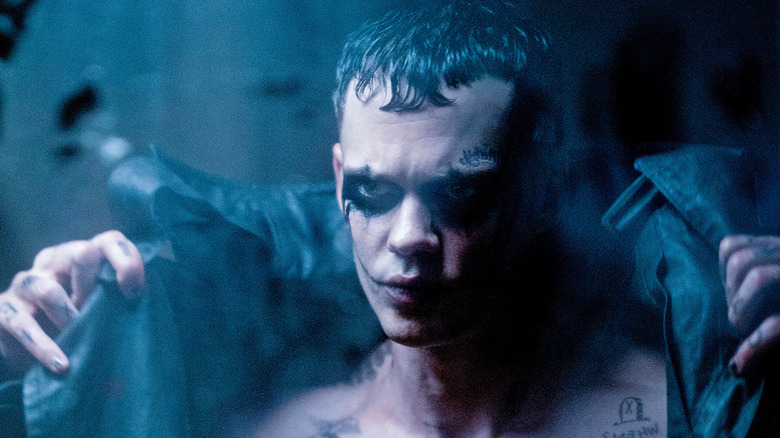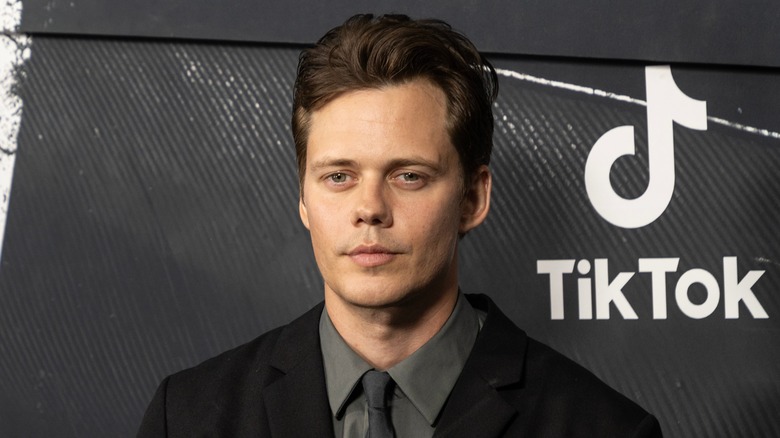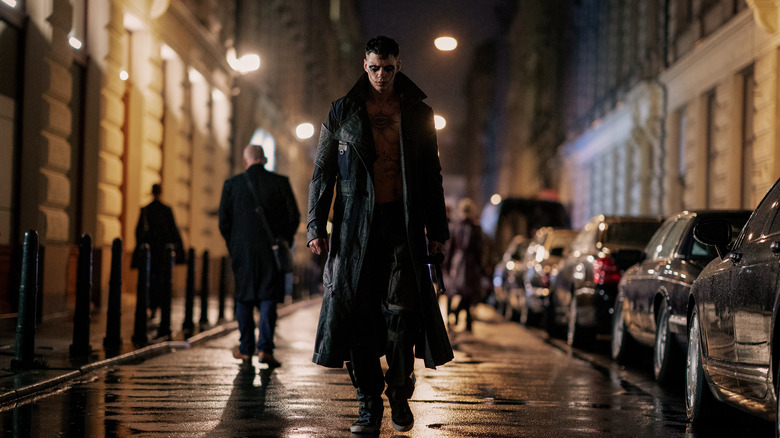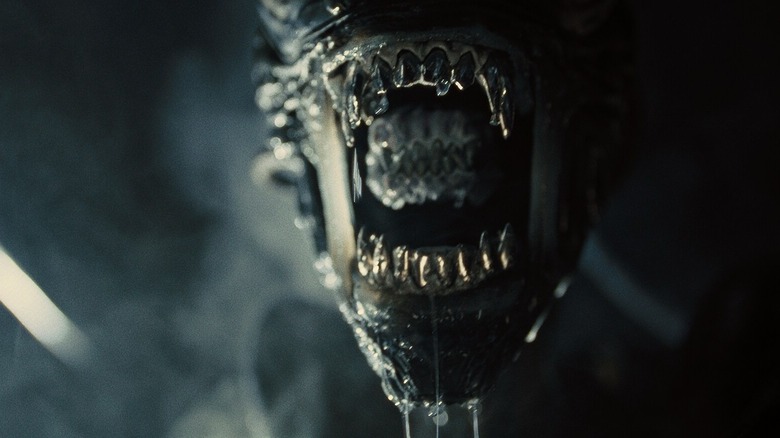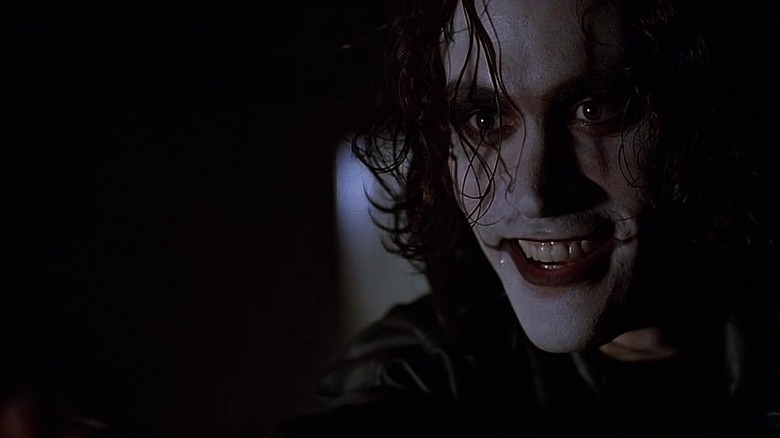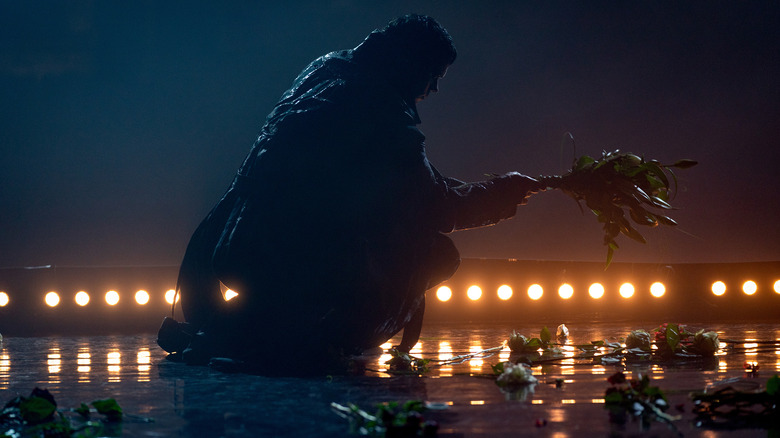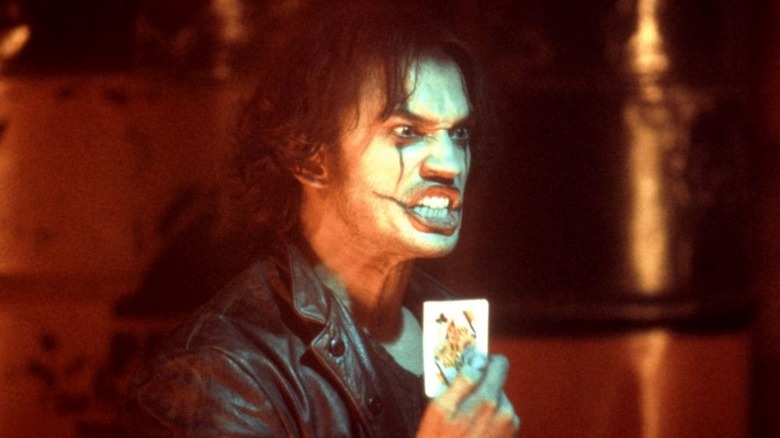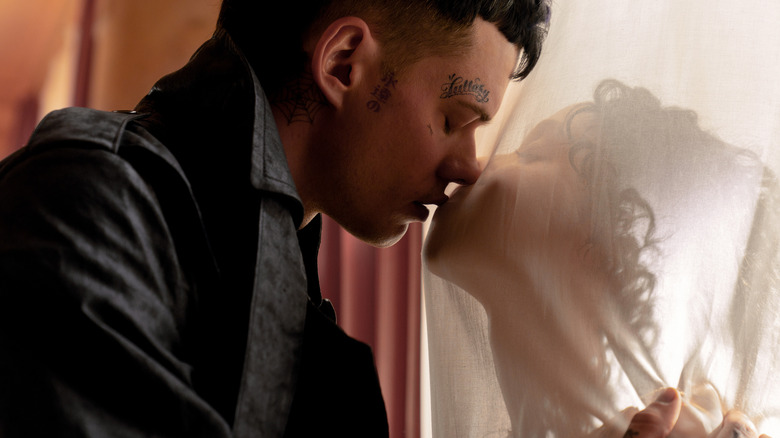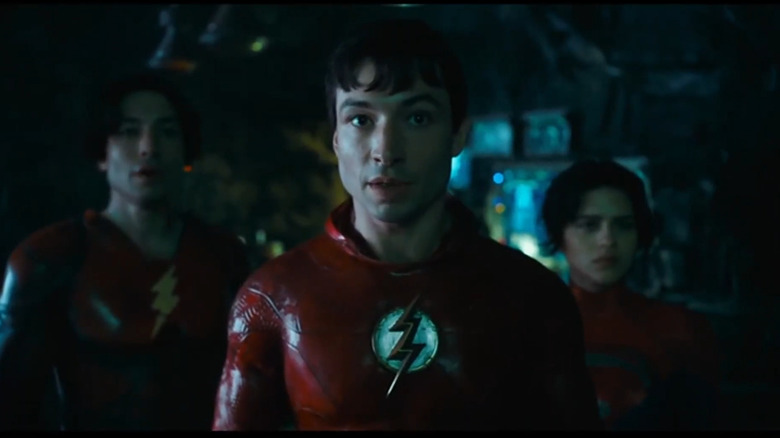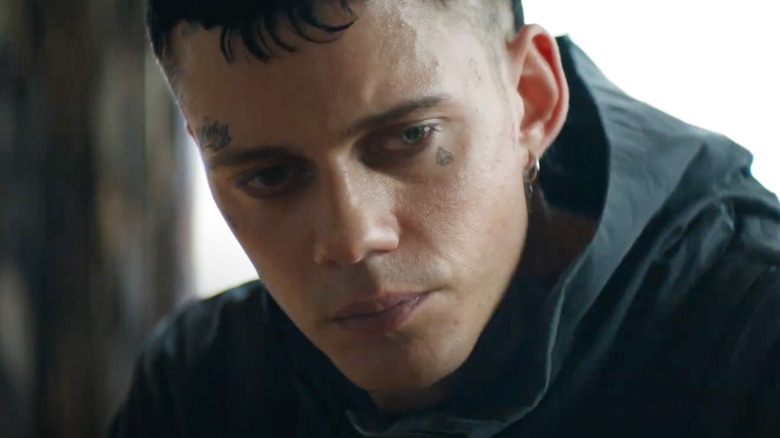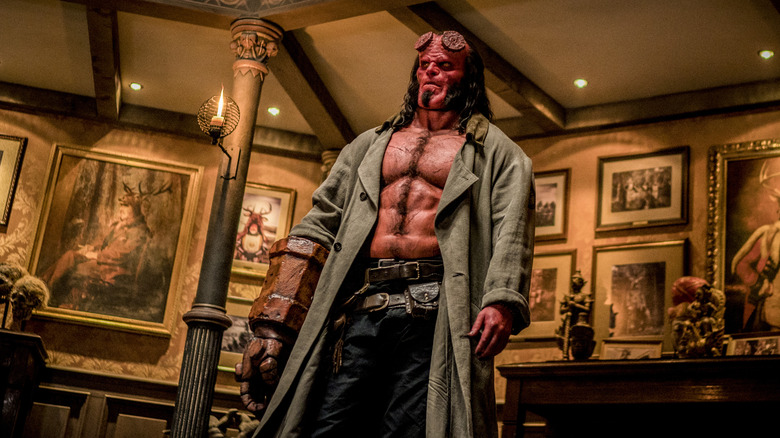Why The Crow Bombed At The Box Office
Few expected that the 2024 "The Crow" remake would be a box office phenomenon. However, nobody thought it would do as poorly as it did over its domestic opening weekend. The reboot failed to take flight, with just a $4.6 million domestic debut. In the pantheon of superhero movies, "The Crow" opened just 5% more than the forgotten 1999 title "Black Mask" and beneath infamous box office bombs like "Supergirl."
Staggeringly, "The Crow" even opened to roughly half the North American opening weekend of "Bloodshot." That's despite that 2020 superhero movie opening just as COVID-19 started driving audiences away from theaters. More folks were willing to risk getting COVID in March 2020 than see "The Crow" on opening weekend in August 2024 ... that must sting.
When a movie like "The Crow" capsizes this badly at the box office, there's never just one reason for the immense failure. There are always a slew of factors that inform the financial shortcomings of these would-be blockbusters. In the case of "The Crow," a multitude of elements — ranging from a dismal marketing campaign to a poor release date to people's reverence for the original "Crow" movie (among many other defects) — coalesced to create one of the biggest superhero movie bombs of the 21st century. Read on to find out why "The Crow" flopped over its opening weekend and what led to it having a worse debut than "Superman IV: The Quest for Peace."
The marketing was dreadful
In mid-March 2024 (three months before the movie's original release date), Lionsgate dropped the first trailer for "The Crow." Instantly, the marketing campaign for this remake got off on the wrong foot. The moody trailer (set to a Post Malone/Ozzy Osbourne ditty) confirmed this remake would cover the same storytelling terrain of the original movie and emphasize lots of R-rated violence. Immediately, the press expressed disdain for the project, while the first trailer for the "Crow" remake secured over 91,000 dislikes a few days after its launch. It was a staggering turn of events that instantly created a grim aura over the production that would be difficult to evade.
In the months that followed, Lionsgate failed to improve the standing of "The Crow." Part of that came from the inescapably small scale of the studio's promotional campaign. The studio reportedly spent only $15 million on marketing the feature, just slightly over 10% of the promotional budget for "Deadpool and Wolverine." The meager marketing spend meant that even seemingly no-brainer promotional tie-ins for "The Crow" went unexploited.
Most notably, the 2024 edition of the San Diego International Comic-Con featured no "The Crow" panel or photo opportunities. Even fellow August 2024 Lionsgate bomb "Borderlands" had a recreation of Moxxi's Bar tied into SDCC. Nothing about Lionsgate's "The Crow" marketing screamed confidence, especially when it came to the poorly-constructed trailers. That fatal facet translated into audiences giving the movie the cold shoulder.
It lacked movie stars
When the idea of a "Crow" remake first emerged, Mark Wahlberg's name was attached as a contender for the part. The "Boogie Nights" leading man didn't last long in the role, but several other actors would quickly be eyeballed for the part. In fact, the titular role of "The Crow" became a revolving door that various leading men walked in and out of during the 2010s.
After Wahlberg, Bradley Cooper, Tom Hiddleston, and Jason Momoa, among many others, were connected to the part. The 1994 "Crow" was meant to launch Brandon Lee as a movie star; in a sharp contrast, the initial plan for the "Crow" remake was to merge the property with a red-hot leading man. In the end, Pennywise the Clown himself, Bill Skarsgård, got the role. While the two "It" movies were smash hits, Skarsgård himself would freely admit he's not a box office draw. In fact, "The Crow" was the first time Skarsgård was top-billed on a theatrical wide-release movie.
Surrounding Skarsgård in the supporting cast was famous musician FKA Twigs (who's had minimal exposure as an actor) and character actor Danny Huston. Few recognizable faces littered the rest of the cast. There was nobody in "The Crow" famous enough to inspire the sort of passionate audience interest to overcome all the negative mojo surrounding this remake. Opting for a cast of lesser-known performers helped seal the film's grisly box office fate.
The Crow isn't a huge brand name anymore
The very first rumblings of a straightforward "The Crow" remake came in 2008, just three years after the last direct-to-video sequel to the original film — "The Crow: Wicked Prayer" — hit the marketplace. At this point in time, "The Crow" was still relatively fresh on people's minds. It was also an era when the superhero movie marketplace was still far from peak capacity. That's a radically different pop culture landscape than the one that "The Crow" finally entered in August 2024.
By the time the remake opened, it had been over three decades since the original "Crow" premiered and nearly two decades since the last time a new "Crow" movie bowed. The iron hadn't just cooled on the "Crow" brand name — it had gone arctic cold. That inescapable element of reality appeared to evade Lionsgate's marketing team. The abysmal campaign for "The Crow" leaned too heavily on the pre-existing brand name, with many of the posters and TV spots merely establishing that a new "Crow" movie was on the horizon.
Some franchises can get away with simply leaning on a familiar logo, like the "Jurassic World" movies. Perhaps that promotional approach would have been enough back in 2011 or 2012, but a 2024 "Crow" remake needed to do more to get people's attention given how much the franchise had fallen out of vogue.
There was competition from other R-rated movies
There was a time when being an R-rated movie made you stand out in the PG-13-dominated summer moviegoing marketplace. Just look at summer 2013, when the R-rated "The Conjuring" distinguished itself in a sea of PG-13 hits like "Iron Man 3" and "Fast and Furious 6." Summer 2024, meanwhile, has been packed to the gills with R-rated tentpoles. "Bad Boys: Ride or Die," "Alien: Romulus," and especially "Deadpool and Wolverine" have been among the biggest box office hits of the season. This meant that "The Crow" couldn't promote itself as the one big bloody action movie in a season of "sanitized" family-friend fare. Instead, "The Crow" felt like more of the same to the unconverted.
More pressingly, the August 23 release date of "The Crow" put it in direct competition with summer 2024's biggest R-rated movies. "Alien: Romulus" opened successfully just one week earlier, partially satisfying the public's appetite for graphically violent chaos. The real fatal blow, though, was "Deadpool and Wolverine," which topped the domestic box office despite being in its fifth week of release.
"The Crow" was always going to struggle to lure in audiences. That was especially challenging when it debuted into a marketplace where the more light-hearted and better-reviewed "Deadpool and Wolverine" also promised lots of R-rated superhero carnage. Moviegoers who love R-rated features have been overwhelmed with options in summer 2024, a scenario that helped doom "The Crow."
Fans were protective of the original Crow movie
The original 1994 "The Crow" has become an object of deep personal affection for many '90s kids, and this cult following spans many different fanbases beyond just film and comic book geeks. For instance, the original movie is revered for its influence on the metal and punk music scenes. Meanwhile, folks growing up in the goth subcommunity were fond of the film for providing a rare gothic hero in an era of cinema that mostly used goths as a punchline. Then, of course, there's the reverence for the film's late star, Brandon Lee, who was accidentally shot and killed while filming "The Crow." That tragedy has led many modern retrospectives of "The Crow" to appreciate Lee's remarkable work in the title role.
Into all this fondness and deep personal connection to "The Crow" came the 2024 remake from director Rupert Sanders. Remakes are a dime a dozen in Hollywood, but something felt extra macabre about this reboot, given the material's permanent intertwining with Lee's personal life. It didn't help that the marketing for the 2024 "Crow" made the new film look sanitized and mainstream, a sharp contrast to the way the original feature resonated deeply with grimy subcultures. This new "Crow" was supposed to ride familiarity with the original brand name to box office glory. Instead, people's love for the original "Crow" just made selling a fresh vision an incredibly arduous uphill battle.
There was a dearth of reviews
In the days leading up to "The Crow" finally hitting theaters, a bizarre element of its marketing campaign emerged. Lionsgate wasn't allowing official reviews to drop for the movie until 4pm PT on August 22. That meant many Thursday preview screenings for "The Crow" were well underway by the time critics could publish reviews of the film. It was a strange measure that not only signaled minimal studio confidence in the project, but also meant that there was one less way for "The Crow" to drum up any buzz before its opening day.
To Lionsgate executives, the prospect of "The Crow" becoming a critical punching bag before release may have sounded like a nightmare. However, one must remember the axiom "there's no such thing as bad publicity." Even a deluge of bad reviews two days before release could have inspired some social media chatter surrounding "The Crow." Perhaps it would have even motivated a few moviegoers to plunk down money for tickets in the name of "hate-watching." Instead, the conversation surrounding "The Crow" was totally dead leading up to its first public screenings.
The only "Crow"-related topic some film critics chatted about was a weird promotional double standard where influencers were allegedly allowed to talk about the feature before critics. The absence of any pre-release conversation on "The Crow" just compounded how deeply invisible the project was to many moviegoers. There was nothing, not even some viral negative reviews, to get the movie on people's radars.
There are already too many Crow movies out there
When "Top Gun: Maverick" hit movie theaters in May 2022, one key element fueling anticipation for that blockbuster was how long it had been since the last "Top Gun" movie. In the nearly four decades since Maverick first flew across the silver screen, there had been no other "Top Gun" movies or streaming shows to dilute the brand name. "Top Gun: Maverick" was an event, the first real follow-up to an action drama that '80s moviegoers fell in love with. By contrast, 1994's "The Crow" spawned three sequels, two of which went straight to home video. After 2005's "The Crow: Wicked Prayer," the franchise went into hibernation until the 2024 remake flew into theaters.
Even with 20 years off, "The Crow" had already been plucked over pretty well as a brand name. Not only was the concept of a new post-1994 "Crow" movie no longer special to moviegoers, but there were also four previous "Crow" features for moviegoers to choose from. Why go out of the house to watch a new "Crow" film, treading familiar narrative terrain, when you could just stay home and watch one of the original "Crow" titles? It wasn't even like 2024's "The Crow" was the first "Crow" feature to hit theaters since Brandon Lee's movie, thanks to "The Crow: City of Angels" debuting on the big screen. Above all else, a new "Crow" remake was just plain overkill for audiences.
The Crow held no appeal for younger people
In the wake of the COVID-19 pandemic shutting down movie theaters, several intriguing theatrical moviegoing trends have emerged. One especially critical trend is that Gen-Z moviegoers have turned into the most important audience for studios to pursue. These avid movie theater attendees have fueled some of the biggest post-2021 box office hits domestically, including "Barbie," "Taylor Swift: The Eras Tour," and "Inside Out 2." If you want a lucrative feature film in 2024, you better appeal to folks under the age of 30. Otherwise, you're bound to suffer the fate of older-skewing projects like "Horizon: An American Saga — Chapter One."
That demo's prominence in modern moviegoing was reflected in 58% of the opening weekend audience of "The Crow" firmly landing in the 18-34 age range. However, the film's lack of appeal to a broader range of younger audiences clearly limited its box office potential. Bill Skarsgård isn't a beloved heartthrob on TikTok, and FKA Twigs is nowhere near as famous as Olivia Rodrigo or Chappell Roan with college-aged audiences.
Plus the "Crow" brand name is unknown to younger moviegoers, and nothing in the marketing campaign made the film seem deeply relevant to young people like, say, the trailers for "Challengers" did. Even the embrace of gothic aesthetics in the posters and trailers felt out of step with the modern punk and emo scenes. In courting older nostalgia, "The Crow" eschewed the demographic that's proven critical for any box office phenomenon since 2021.
Superhero movies in the 2020s have been erratic at the box office
The biggest movie domestically so far in the 2020s is "Spider-Man: No Way Home," with its mighty $800 million+ North American haul. But while "No Way Home" flourished financially, superhero movies in general have had a rocky track record this decade compared to the 2010s. There have been plenty of spandex-clad hits, such as "Black Panther: Wakanda Forever" and "Spider-Man: Across the Spider-Verse," but a slew of high-profile, costly bombs have plagued the once-untouchable Marvel and DC brands. This included costly 2023 duds "The Marvels" and "The Flash," both of which failed to match even the domestic opening weekends of prior Marvel and DC titles with their total box office grosses.
This was the unpredictable box office world "The Crow" soared into. When the concept of remaking "The Crow" was first bandied about, the world of superhero movies was mostly printing money, with the exception of misfires like "Jonah Hex." This reboot, however, entered a marketplace where even new Marvel Studios titles can struggle to match box office expectations. Even with "Deadpool and Wolverine" killing it financially, the erratic track record of 2020's superhero movies hasn't vanished, making it rocky terrain for "The Crow" to launch into.
Audience word of mouth was tepid
Sometimes a movie can save itself after a poor opening weekend thanks to great word-of-mouth. If audiences really like what they see, positive notices can spread like wildfire and ensure that a title gains ground after an underwhelming bow. It's a very rare phenomenon, but the likes of "Elemental" and "The Greatest Showman" have shown that such an outcome can exist in the modern world. After a dismal opening day box office performance, the producers of "The Crow" were likely praying that such a fate could befall this superhero movie too.
Unfortunately, the opening night CinemaScore for "The Crow" sealed the movie's fate. Audiences gave "The Crow" a disappointing B- grade. If there's any sliver of an upside for "The Crow," it didn't receive the worst CinemaScore for a 2024 superhero movie: That honor belongs to the C+ score slapped on "Madame Web" back in February. A B- CinemaScore puts "The Crow" in disastrous company in terms of superhero movie word-of-mouth, with the infamous bomb "Dark Phoenix" getting the same grade in June 2019. April 2022's "Morbius," meanwhile, got a similar C+ grade from audiences.
All these earlier titles had catastrophic second-weekend plummets, with those CinemaScores indicating early, immense audience displeasure that warded off other moviegoers. With such disastrous audience responses, The word-of-mouth for "The Crow" ensured there was no way the movie could escape its various other flaws. In other words, there's no chance "The Crow" becomes the next "Elemental."
Lionsgate has a dismal track record with superhero movies
"The Crow" reinforced a very brutal Hollywood truth: if you want to launch a lucrative superhero movie, do not distribute it through Lionsgate. The studio has proven incredibly successful at launching the "John Wick," "Hunger Games," and "Saw" franchises, but its box office track record with superhero films is awful. The studio has distributed a slew of infamous superhero feature flops ranging from "The Spirit" to the 2019 "Hellboy" boondoggle to 2017's costly "Power Rangers" bomb. Most of Lionsgate superhero fare is doomed to fail, a destiny that a production as tormented as "The Crow" couldn't avoid.
Lionsgate's main problem with launching superhero fare is that it typically acquires and releases titles based on superheroes who have already had big screen adventures. Hellboy, Power Rangers, The Crow — these are all characters that had previously famous cinematic incarnations.
Trying to wring hits out of such overly familiar brands has never been a recipe for success for Lionsgate, dating back to the days of "Punisher: War Zone." The distributor's endless challenges with marketing such titles only twists the knife with these doomed projects. "The Crow" would probably have never made bank even with Disney distribution, but Lionsgate's cursed handling of the superhero genre certainly did it no favors.
